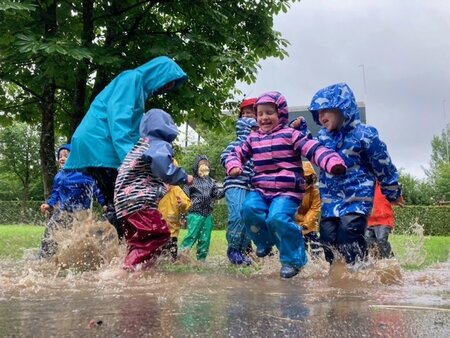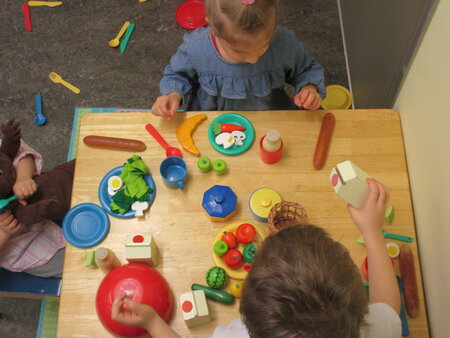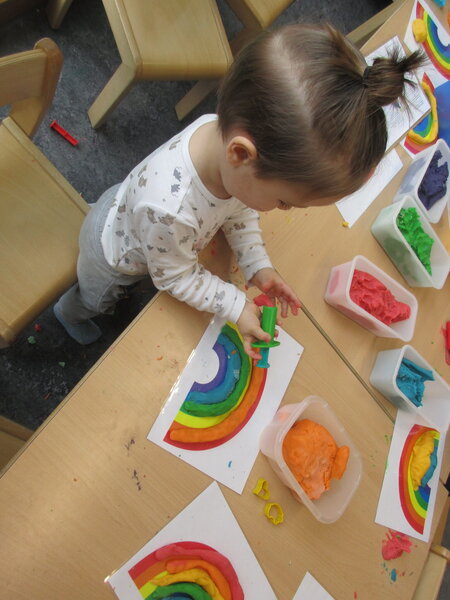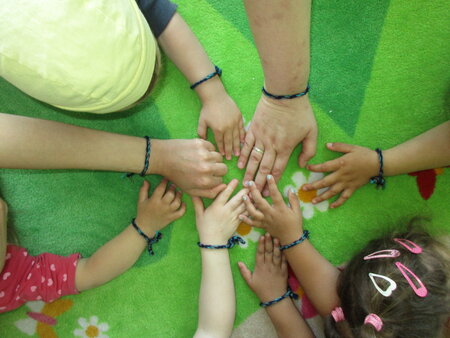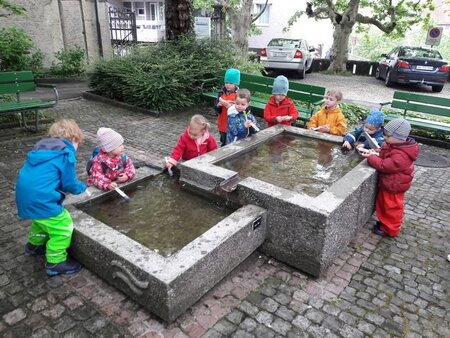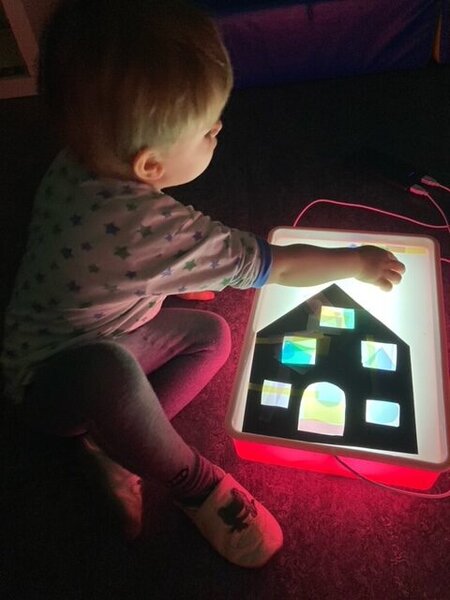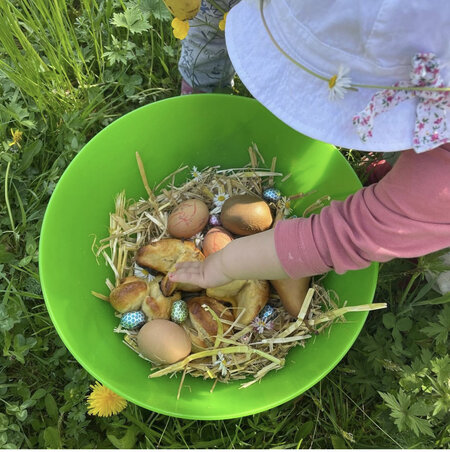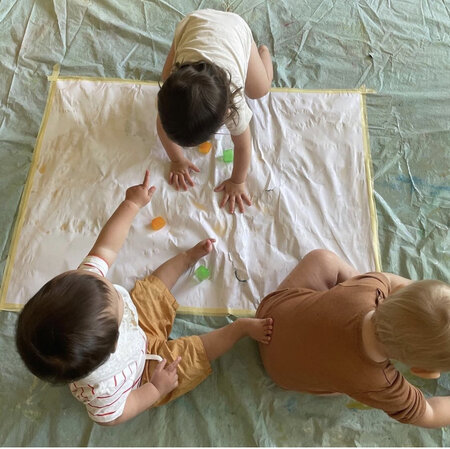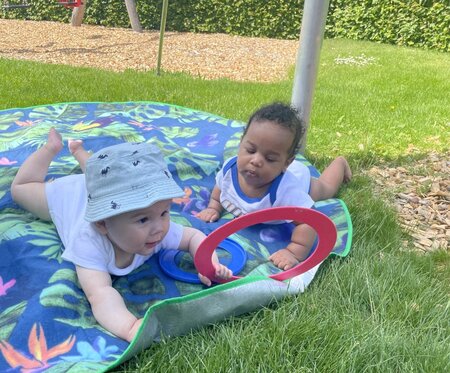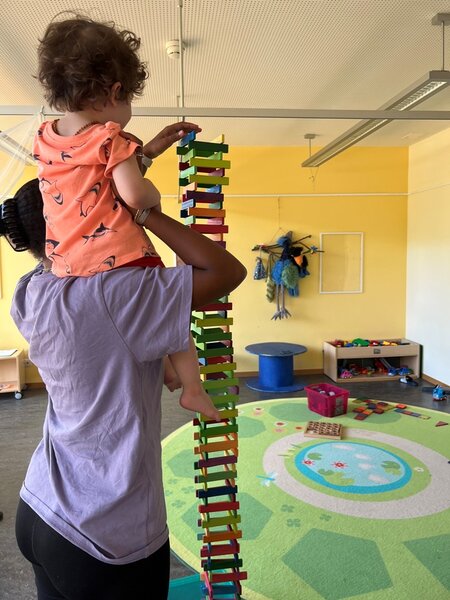Alongside our planned activities, we maintain a structured daily routine that includes shared meals, walks, and forest excursions. It’s crucial to us that there is ample space for the individual needs of each child and group. Our diverse range of activities supports children’s development, fostering independence, self-confidence, and social skills. We care for 22 children daily, divided into two mixed-age groups of up to 11 children each, with a maximum of 3 babies per group.
Daily routine
Arrival and breakfast
| 07:00 AM - 08:30 AM | Children arrive and have the option to eat breakfast if they wish |
Routine
| 09:00 AM | Morning circle |
| 09:00 AM - 10:45 AM | Project-oriented activities, free play, or outdoor time |
| 11:15 AM - 11:50 AM | Lunch |
| 12:00 AM - 1:45 PM | Sleep - Resting |
| 2:00 PM - 3:15 PM | Project-oriented activities, free play, or outdoor time |
| 3:15 PM - 3:45 PM | Afternoon snack |
In the morning, children can choose to engage in a learning area and explore their own interests. Our daily project program, which children can join independently, is designed to stimulate various areas of development.
Pick-up, free play and apple round
| from 4:30 PM | The childer are ready for pick-up |
| 5:00 PM - 5:30 PM | Apple round |
| until 6:30 PM | All children are handed over to their parents, the Daycare Center closes |
Rituals at Kolibri
Rituals are integral to us, structuring the daily routine and providing children with clarity, orientation, and security. Children love and need rituals to navigate the diversity of everyday life in manageable steps. Rituals enhance concentration, facilitate learning, and help children adhere to rules and boundaries.
Our day begins with the morning circle, where we sing and discuss the day’s activities. Wanda, the forest owl, accompanies the children on forest excursions. The tidying-up song signals a change in activities. Birthdays are celebrated with a birthday crown and a special song. Mealtimes are framed by rituals such as washing hands, singing, and tidying up.
Meals
We place great importance on providing balanced, healthy food. We also accommodate individual dietary requirements, such as allergies, in consultation with parents.
Our main meal at lunchtime is sourced from the canteen kitchen of the Baden Regional Care Center, which offers a high-quality, balanced menu. We create our own tailored menu: one or two days a week feature a meat-based dish, while the remaining days focus on vegetarian options. We offer a choice of two side dishes and two types of vegetables, along with a daily salad.
Children can decide how much they want to eat and can help themselves to seconds, promoting independence and helping them learn to listen to their bodies.
Water and tea are always available throughout the day. We prepare breakfast and afternoon snacks ourselves, emphasizing seasonal foods, healthy snacks, and variety. Desserts are reserved for special occasions like birthdays, departures, or celebrations, and are usually homemade and brought in. With our on-site kitchenette, children can occasionally help prepare snacks such as pizza rolls, biscuits, or apple slices.
Sleep and rest
A post-lunch break is crucial for the children, as they often wake up earlier on nursery days than on days spent at home, leaving them tired after lunch. This break ensures a positive atmosphere for afternoon activities.
The oldest children, who start kindergarten in August, can rest in the retreat corners. They can lie or sit on the sofa, listen to a radio play, or look at a picture book. This is followed by a needs-oriented, supervised activity, allowing them to engage in quiet, age-appropriate play such as ironing beads, small Lego bricks, or magnetic games.
Younger children go to the sleep room, where each has an assigned place with a mattress, cuddly toy, pacifier, or "Nuschi". Two caregivers accompany them, starting with a bedtime ritual: children choose a book to look at in their place. Once all are settled, each child is rubbed with “goodnight cream” in a spot of their choice. Soft music is played, and caregivers sit with the children, stroking them to sleep if desired, or simply staying quietly until all are asleep. After waking, children return to the group room on their own.
Very young babies may sleep in a hammock or bassinet. Depending on their habits, they either fall asleep on their own or are accompanied to sleep, often using carrying aids or baby carriages to help them settle.



